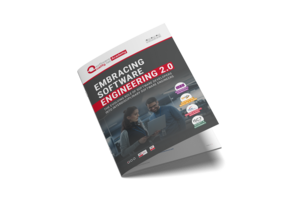
Requirements Engineering
Seminars for Requirements Engineering
Good requirements are the foundation for a successful project.
Professional requirements engineering plays a central role as part of software quality engineering by ensuring that software products are tailored to the needs and requirements of users from the outset. For this purpose, requirements are appropriately identified, adequately documented, verified, coordinated with the customer, and properly managed. This discipline lays the foundation for high quality by defining precise and complete requirements, which forms the basis for development, testing, and assessing software quality. Through the seamless integration of requirements engineering into software quality engineering, development teams can effectively ensure that the end products not only function flawlessly technically but also fully meet the expectations and requirements of users.
How further education in Requirements Engineering can positively influence your project
Thorough training in requirements engineering (RE) can have far-reaching positive effects on your software project. By deepening your knowledge and skills in this area, you and your team can improve efficiency, increase software quality and ultimately ensure stakeholder satisfaction.
Improved communication and understanding
One of the biggest challenges in RE is communicating effectively with stakeholders and understanding their needs and expectations. Training can help to learn effective requirements elicitation techniques and can help to conduct better interviews, workshops and other requirements gathering methods. This can lead to a deeper and clearer understanding of requirements and minimize misunderstandings that can lead to errors and delays.
Improved quality of requirements
Further training in RE can also help to improve the quality of the requirements elicited. You can learn how to formulate requirements clearly, unambiguously and completely, how to prioritize them and how to put them into a form that can be understood and implemented by all team members. A higher quality of requirements can lead to a higher quality of the developed software.
More efficient management of requirements changes
Changes to requirements are a common cause of delays and cost overruns in software projects. Through training in RE, you and your team can learn effective techniques for managing requirements changes. This can help minimize the impact of changes and ensure that they are implemented efficiently and without compromising software quality or the project schedule.
Better adherence to deadlines and budgets
By helping to improve communication, the quality of requirements and the management of requirements changes, training in RE can help to meet deadlines and control budgets. A clear and stable set of requirements can help improve planning and estimating, which in turn leads to better control of time and costs.

Whitepaper
Embracing Software Engineering 2.0
How developers are evolving into interdisciplinary engineers
Quality starts in the head - with trainings from Software Quality Lab
We offer the following seminars and trainings on this topic in the Software Quality Academy:
- IREB® Certified Professional for Requirements Engineering - Foundation Level (CPRE-FL) [DE]
- IREB® Certified Professional for Requirements Engineering - Foundation Level (CPRE-FL) [EN]
- IREB® Certified Professional for Requirements Engineering - Advanced Level (CPRE-AL): RE@Agile [DE]
- IREB® Certified Professional for Requirements Engineering - Advanced Level (CPRE-AL): Requirements Elicitation [DE]
- IREB® Certified Professional for Requirements Engineering - Advanced Level (CPRE-AL): Requirements Management [DE]
- IREB® Certified Professional for Requirements Engineering - Advanced Level (CPRE-AL): Requirements Modeling [DE]
- IREB® CPRE RE@Agile Primer [DE]
- UML Basics für Fachbereichsmitarbeiter (Praxistraining) [DE]
- User Story Mapping [DE]
- Agile Aufwandsschätzung [DE]
- Aufwandsschätzung in Softwareprojekten [DE]
- Grundkurs Technisches Schreiben [DE]
- Professionelles Requirements Engineering und Management [DE]
- Professionelles Requirements Engineering für die Hardware- und Systementwicklung [DE]
- Requirements Engineering für die agile Softwareentwicklung [DE]
- IREB® Digital Design Professional - Foundation Level v2.0 (DDP-FL) [DE]
Consulting
Our associated consulting company Software Quality Lab GmbH provides you with comprehensive project support:
Good requirements are the cornerstone of successful software projects. Requirements Engineering (RE) is a critical component of the software lifecycle, ensuring that software products and projects are designed and built to meet the needs and expectations of the customers and users.
Effective Requirements Engineering involves systematically identifying, documenting, validating, and managing requirements throughout the project lifecycle.
This process ensures that development teams have a clear understanding of what needs to be built, minimizing misunderstandings and costly rework. Clear, sufficient, and appropriate functional and quality requirements provide a solid foundation for development, testing, and quality assurance activities, leading to higher software quality and improved project outcomes in both agile as well as plandriven environments.
By integrating professional Requirements Engineering Activities early in the development cycle, projects can benefit from:
Enhanced Communication and Understanding
Properly conducted agile requirements engineering facilitates effective dialogue with stakeholders. Through structured elicitation techniques such as interviews and workshops, teams gain a deeper understanding of user needs, reducing the risk of misinterpretation and misalignment.
Higher Quality of Requirements
Well-defined requirements are crucial for software success. They ensure clarity, completeness, prioritization, and effort estimation, making them easier for the entire development team to understand and implement correctly.
Efficient Change Management
Change is inevitable in software projects. With professional Requirements Engineering, teams can manage evolving requirements more effectively, ensuring changes are handled without jeopardizing project timelines or software quality.
Improved Project Control
Clear and stable requirements contribute to better planning and estimation, which helps teams stay within budget and meet deadlines more consistently.
Investing in professional Requirements Engineering training and workshops and adopting systems and software engineering practices helps ensure that software projects deliver not only functional products but also solutions that meet user expectations and business objectives. Prioritizing this discipline can be the key to transforming your software development process, leading to greater efficiency, reduced risks, and more successful outcomes.
Our expertise in requirements engineering, software engineering and testing, as well as extensive knowledge of standards, best practices and compliance requirements for software development organizations ensure high-quality results.

